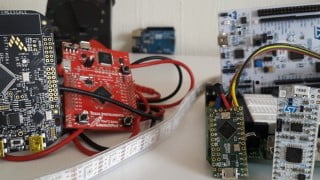Beyond Arduino: Electronics for Developers & Makers – (GPIO)
Learn how to design hardware for IoT applications and add-on circuitry for popular development boards like Arduino and Raspberry Pi. Understand how microcontrollers interact with supporting hardware and gain insights into dumbed-down libraries. This course is ideal for makers with hardware experience, coders familiar with Raspberry Pi or Arduino, and beginners who prefer hands-on applications. Not suitable for advanced hardware designers or electrical engineers. Not an introductory microcontroller, theoretical electronics, or programming course. No prior knowledge of Arduino or programming languages required.
What you’ll learn
- Design the hardware around your IoT applications
- Design add-on circuitry for popular development boards such as Arduino and Raspberry Pi.
- Understand how a microcontroller interacts with its supporting hardware
In this course you will learn that there’s more to life than the Arduino Uno and that there’s probably a better way to do what you’ve been doing with microcontrollers. Yes, Arduino is an excellent platform to get you started, but you will learn that Arduino is not part of the day to day electronics you use like your TV, microwave oven or car dashboard.
Do you know how the supporting hardware in a microcontroller work? Well, you will learn that here. Also as a bonus you will learn how the functions in dumbed-down libraries work.
This is not exactly a hands-on course, not if you don’t want it to be. There are no promises on the projects you’ll make because I won’t force you to build something you didn’t choose to. However, I strongly recommend that you code along. Several microcontroller development platforms are showcased, but you should follow the examples with your own microcontroller.
You should know that most lectures have the following elements:
-Recommended Material
-“Recall” Slide
-Actual lecture content
-Live Demo
– and Quizzes
Who this course is for:
- Makers who have some experience with hardware and would like to learn how these circuits work with as few equations as possible.
- Coders who were introduced to hardware through some development board popular in the Maker movement, such as the Raspberry Pi or Arduino (e.g. blinking an LED, reading push button input)
- Beginners who would rather skip the boring theory and math, and dive into fun hands- on applications that move, light up and make sounds instead.
- This course is not for advanced hardware designers or electrical engineers.
- This is not an introductory Microcontroller course. You will not learn to use an Arduino board by taking this course.
- This is not a theoretical electronics course. Some of the basics are covered but we won’t study differential equations, transforms, or transfer functions.
- This is not a programming introductory course. You won’t learn C, python or Java by taking this course.
User Reviews
Be the first to review “Beyond Arduino: Electronics for Developers & Makers – (GPIO)”
You must be logged in to post a review.







There are no reviews yet.